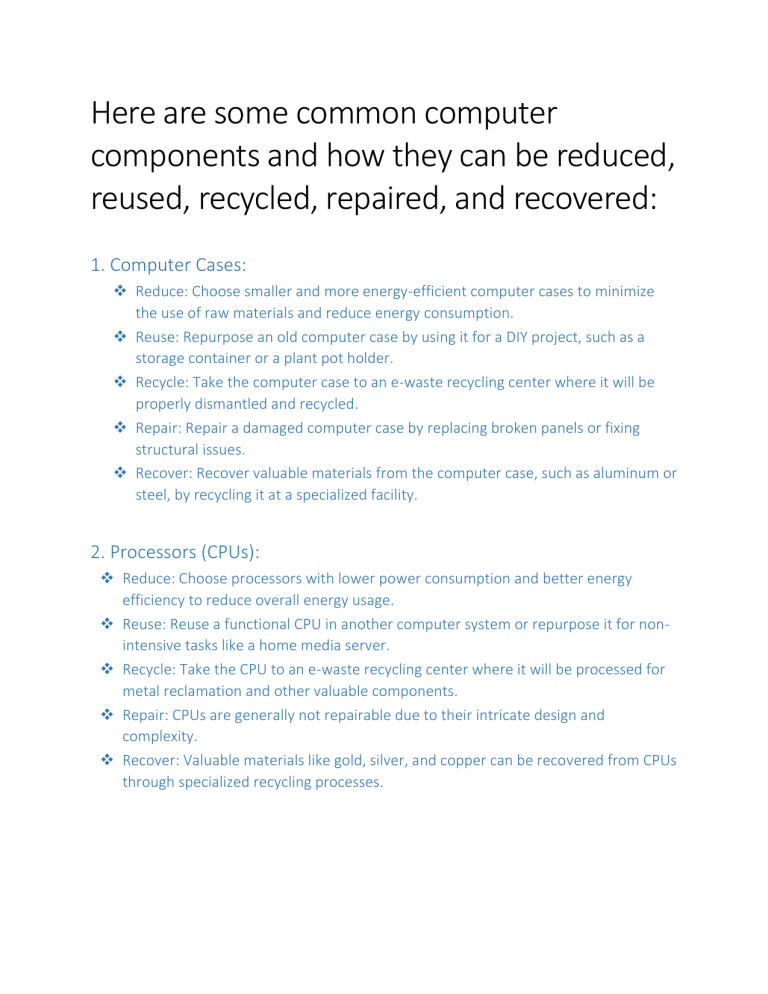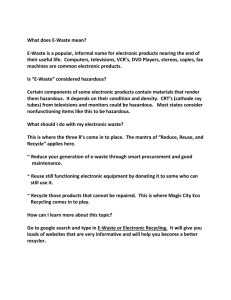
Here are some common computer components and how they can be reduced, reused, recycled, repaired, and recovered: 1. Computer Cases: Reduce: Choose smaller and more energy-efficient computer cases to minimize the use of raw materials and reduce energy consumption. Reuse: Repurpose an old computer case by using it for a DIY project, such as a storage container or a plant pot holder. Recycle: Take the computer case to an e-waste recycling center where it will be properly dismantled and recycled. Repair: Repair a damaged computer case by replacing broken panels or fixing structural issues. Recover: Recover valuable materials from the computer case, such as aluminum or steel, by recycling it at a specialized facility. 2. Processors (CPUs): Reduce: Choose processors with lower power consumption and better energy efficiency to reduce overall energy usage. Reuse: Reuse a functional CPU in another computer system or repurpose it for nonintensive tasks like a home media server. Recycle: Take the CPU to an e-waste recycling center where it will be processed for metal reclamation and other valuable components. Repair: CPUs are generally not repairable due to their intricate design and complexity. Recover: Valuable materials like gold, silver, and copper can be recovered from CPUs through specialized recycling processes. 3. Memory Modules (RAM): Reduce: Optimize memory usage and avoid excessive RAM upgrades to reduce unnecessary consumption. Reuse: Use functional RAM modules in other systems or repurpose them for DIY projects, such as making a keychain or a decorative accessory. Recycle: Take old or defective RAM modules to an e-waste recycling facility that can recover valuable materials like gold and silver. Repair: RAM modules are not typically repairable; they are generally replaced if faulty. Recover: Valuable materials can be recovered from RAM modules through recycling processes, such as metal extraction. 4. Hard Drives: Reduce: Minimize data storage needs through efficient file organization and regular data cleanup. Reuse: Repurpose old hard drives as external storage devices or backup drives for personal data. Recycle: Take old or non-functional hard drives to an e-waste recycling center where they will be securely recycled and their valuable materials recovered. Repair: Hard drives can sometimes be repaired by replacing faulty components or seeking professional data recovery services. Recover: Valuable materials like aluminum, copper, and rare earth magnets can be recovered from hard drives through recycling processes. 5. Monitors: Reduce: Choose energy-efficient monitors and adjust brightness settings to minimize energy consumption. Reuse: Use functional monitors as secondary displays, repurpose them for multimedia purposes, or donate them to schools or non-profit organizations. Recycle: Take old or non-functional monitors to an e-waste recycling center that specializes in electronic devices. Repair: Some monitor issues can be repaired by replacing faulty components like capacitors or cables. Recover: Recycle monitors at specialized facilities to recover valuable materials such as glass, plastic, and metals. Remember, when disposing of electronic components, always follow local regulations and guidelines for e-waste disposal. Prioritizing reduction, reuse, and recycling helps conserve resources, reduce waste, and minimize the environmental impact of computer components.



